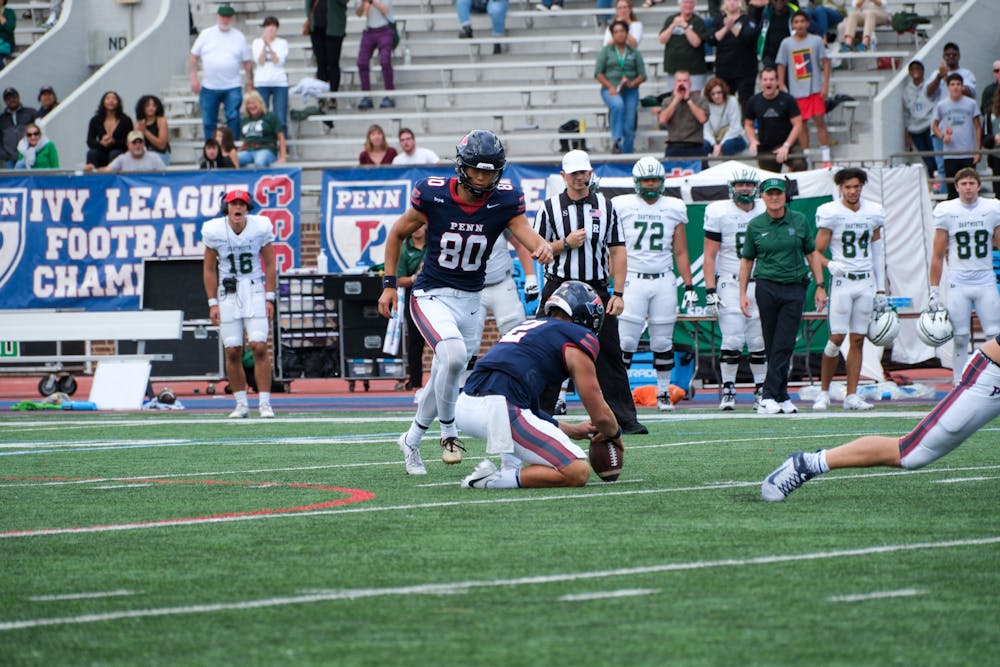
Now-senior kicker Albert Jang attempts a field goal against Dartmouth on Sept. 30, 2023.
Credit: Abhiram JuvvadiAs this year’s football season draws to a close, Penn football’s special teams can’t go without major kudos for kicking the group into top gear over the past few months.
The Quakers now lead the country in opposing punt return yardage and are the only college football team with negative opposing punt return yardage.
How did the Red and Blue land on top? An unconventional — but highly effective — punting strategy.
Senior kicker/punter Albert Jang described the team’s strategy as a “putting together both the rugby style and traditional style of punting.”
“I'm kicking it in a rugby style punt, but I'm only taking one step off to the side,” Jang said. “So our entire operation time is under two seconds.”
The Quakers play a game of “cat and mouse” with the returner. In most punting schemes, teams direct the punt to one side and have coverage go in that direction. The Red and Blue, on the other hand, kick the football to the opposite side of the returner so that the returner team has to put two returners on the field instead of one.
“Our punts just virtually are never going to get caught,” he added. “The way I punt the ball puts an unnatural spin on it that makes it very difficult to catch. We’ve forced three muffed punts this season already and recovered two. So if they do decide to catch it, they risk muffing it.”
Jang hit the longest punt in school history — 71 yards — in last weekend’s nail-biting Homecoming game against the Harvard Crimson.
Head football coach Ray Priore described the process that went into developing the Quakers’ new strategy. Last year, he said, the team’s consistency with the normal punt was “sort of erratic.”
“We were in tight formations and our guys could not cover and be effective and we were giving up way too many yards in returns,” he described.
As a result, the decision was made to shift closer to a rugby-style punt rollout that sprays the ball all over the field. Priore credited the new strategy with giving the team an edge due to its uniqueness, allowing them to avoid punt blocks.
He highlighted Jang as someone who has “really crafted his art of punting in this style very well” and served as a really good mentor to his fellow special teams players as well as others on the team. Special teams coach Rick Ulrich described a similar need for a change in strategy after the team’s punt coverage last year.
“We were just in formations that kind of tipped off how we were blocking and protecting the punt,” he said. “Now, the offense has been taking the ball over, and in three instances, it’s all been less than 50 yards to go for a touchdown.”
He called Jang the “most pivotal” in terms of placing the ball.
“The long snapper never blocks, so there's always going to be one person free, and we just have to try to decide which guy's coming free,” Ulrich said. “And we do that with maybe moving [Jang] off of the centerline, either to the right or to the left. He's just been taught to take one or two steps and, and, and quickly kick the ball, and he does that perfectly.”
He added that Jang’s leadership skills stem from his ability to “do exactly what [they] need him to do,” which has bolstered his confidence level. Jang, who works 20-30 hours a week on top of school and football, highlighted the similarly hard working nature of the team as one of his favorite parts of being on it.
“Everyone is a grinder,” he said. “That's probably my favorite thing about the team is everyone pushes each other to work hard.”
Looking to the future, he stated that he’s hoping to finish the season strong and think about possibly taking a fifth year “after [the Quakers] beat Princeton.”
“I'm just taking it day by day right now and being where my feet are,” he added.
The Daily Pennsylvanian is an independent, student-run newspaper. Please consider making a donation to support the coverage that shapes the University. Your generosity ensures a future of strong journalism at Penn.
Donate






